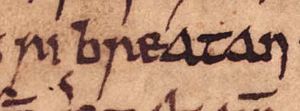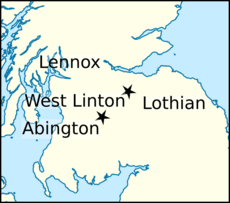Rhydderch ap Dyfnwal facts for kids
Rhydderch ap Dyfnwal was an important person from Cumbria in the 900s. He is known for killing Cuilén mac Illuilb, who was the King of Alba (an old name for Scotland) in the year 971. Rhydderch might have been the son of Dyfnwal ab Owain, who was the King of Strathclyde, a kingdom in what is now southern Scotland and northern England. It's possible Rhydderch himself ruled as King of Strathclyde for a short time.
After King Cuilén died, the Kingdom of Strathclyde was invaded by the new Scottish king, Cináed mac Maíl Choluim. This attack was probably revenge for Rhydderch killing Cuilén. It also might have been a way for the Scottish king to show his power over Strathclyde. If Rhydderch was a king, it must have been before 973, because by then, Dyfnwal's other son, Máel Coluim, was known as king.
Who Was Rhydderch?
Rhydderch lived during the time when Cuilén mac Illuilb was King of Alba. Cuilén was king from about 966 to 971. Several old writings mention Cuilén's death in 971.
- The Chronicle of the Kings of Alba says that Cuilén and his brother, Eochaid, were killed by Britons (people from Strathclyde).
- The Annals of Ulster also reports that Cuilén died fighting Britons.
- The Chronicon Scotorum says Britons killed him inside a burning house.
The Chronicle of the Kings of Alba says Cuilén died at a place called "Ybandonia." Another old book, the Chronicle of Melrose, says he died at "Loinas." This name might refer to Lothian or the Lennox, which are areas in Scotland. These places would make sense for a fight between Scots and Britons.
The Chronicle of the Kings of Alba tells us that Rhydderch was the one who killed King Cuilén. It also says Rhydderch was the son of a man named Dyfnwal. The old text suggests Rhydderch killed Cuilén because of something involving his own daughter. This likely means there was a serious conflict or insult that led to the fight.
Rhydderch's Place in History
Many historians believe Rhydderch was a son of Dyfnwal ab Owain, the King of Strathclyde. Even though there's no clear proof that Rhydderch was a king himself, the fact that he was powerful enough to defeat King Cuilén suggests he was a very important leader.
At the time Cuilén died, a granddaughter of Dyfnwal would have been a teenager or young adult. It's possible that King Cuilén was visiting the King of Strathclyde's court. This visit might have been about Cuilén showing his power over the Britons. Cuilén's sudden death suggests that the Scots might have gone too far, and Rhydderch had to fight back.
The place name West Linton in Lothian was once called "Lyntun Ruderic" in the 1100s. This might mean that Rhydderch had a connection to this area, and it could even be where Cuilén and his brother died.
Another idea is that Cuilén's father had taken over Edinburgh, which included parts of Lothian. So, if Cuilén died in Lothian, it could mean he was trying to control this area when Rhydderch took the chance to get revenge for the conflict involving his daughter.

Rhydderch is only mentioned in old writings that talk about Cuilén's death. We don't hear about him again after that.
After Cuilén, Cináed mac Maíl Choluim became the new King of Alba. One of his first actions was to invade the Kingdom of Strathclyde. This attack was probably revenge for Cuilén's death and a way to show Scottish power. However, Cináed's invasion failed. This defeat, along with Cuilén's killing, shows that the Kingdom of Strathclyde was a strong power back then.
The Chronicle of the Kings of Alba says that King Cináed built a fort near the River Forth, possibly near Stirling. This fort might have been built to stop attacks from the Cumbrians of Strathclyde.
It's possible that Rhydderch became king after Dyfnwal when Cuilén died. But another idea is that Dyfnwal was still king, and Cináed's attack was the last big fight of Dyfnwal's rule. We know that Dyfnwal's son, Máel Coluim, became King of Strathclyde by 973. This is because Máel Coluim seemed to accept the rule of Edgar, King of the English that year. This suggests that if Rhydderch was Dyfnwal's son, he was either dead or no longer able to rule by 973.
Rhydderch's name appears in different ways in old books. Some forms of his name are like "Rhydderch," which was a common British name. Other forms look like "Amdarch," which might be a mistake in the old texts.
 | James Van Der Zee |
 | Alma Thomas |
 | Ellis Wilson |
 | Margaret Taylor-Burroughs |




